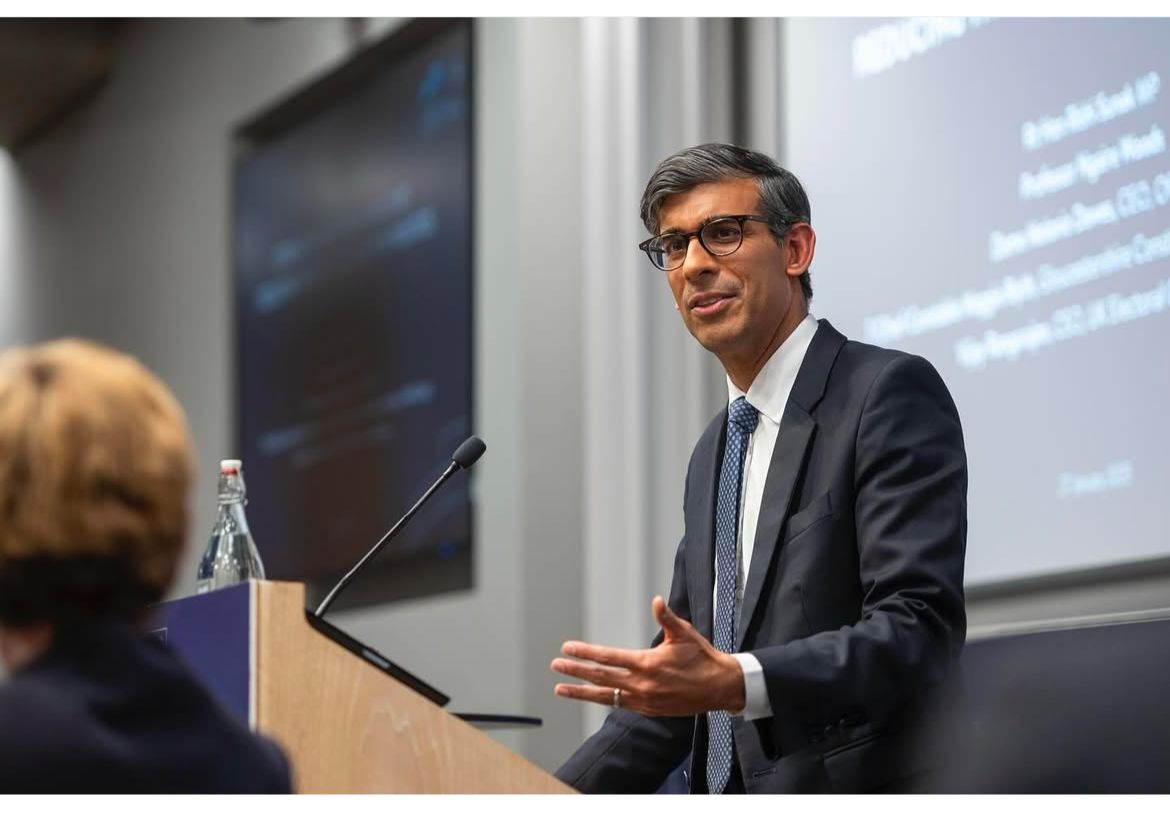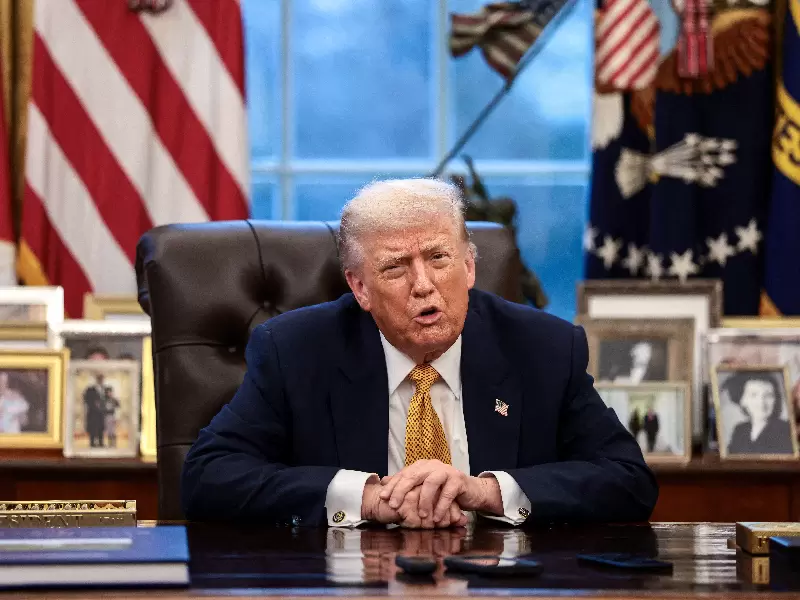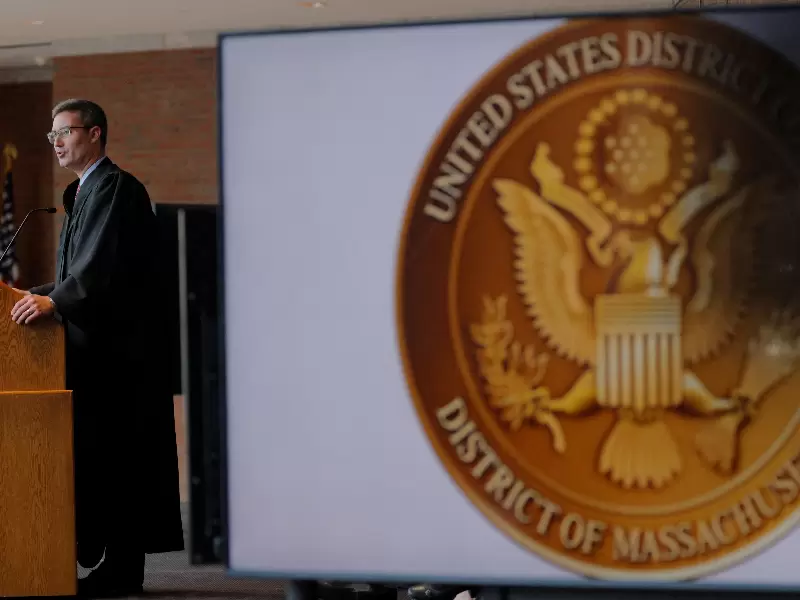Two-thirds of the DOJ unit defending Trump policies in court have quit
Sixty-nine of the roughly 110 lawyers in the Federal Programs Branch have voluntarily left the unit since President Donald Trump's election in November or have announced plans to leave.
.JPG) FILE PHOTO: FILE PHOTO: U.S. President Donald Trump speaks to the media after the U.S. Supreme Court dealt a blow to the power of federal judges by restricting their ability to grant broad legal relief in cases as the justices acted in a legal fight over Trump's bid to limit birthright citizenship, in the Press Briefing Room at the White House in Washington D.C., June 27, 2025. / REUTERS/Ken Cedeno/File Photo
FILE PHOTO: FILE PHOTO: U.S. President Donald Trump speaks to the media after the U.S. Supreme Court dealt a blow to the power of federal judges by restricting their ability to grant broad legal relief in cases as the justices acted in a legal fight over Trump's bid to limit birthright citizenship, in the Press Briefing Room at the White House in Washington D.C., June 27, 2025. / REUTERS/Ken Cedeno/File Photo
The U.S. Justice Department unit charged with defending against legal challenges to signature Trump administration policies - such as restricting birthright citizenship and slashing funding to Harvard University - has lost nearly two-thirds of its staff, according to a list seen by Reuters.
Sixty-nine of the roughly 110 lawyers in the Federal Programs Branch have voluntarily left the unit since President Donald Trump's election in November or have announced plans to leave, according to the list compiled by former Justice Department lawyers and reviewed by Reuters.
Also read: Trump judicial nominee pressured DOJ to defy court on deportations, whistleblower says
The tally has not been previously reported. Using court records and LinkedIn accounts, Reuters was able to verify the departure of all but four names on the list.
Reuters spoke to four former lawyers in the unit and three other people familiar with the departures who said some staffers had grown demoralized and exhausted defending an onslaught of lawsuits against Trump's administration.
"Many of these people came to work at Federal Programs to defend aspects of our constitutional system," said one lawyer who left the unit during Trump's second term. "How could they participate in the project of tearing it down?"
Critics have accused the Trump administration of flouting the law in its aggressive use of executive power, including by retaliating against perceived enemies and dismantling agencies created by Congress.
The Trump administration has broadly defended its actions as within the legal bounds of presidential power and has won several early victories at the Supreme Court. A White House spokesperson told Reuters that Trump's actions were legal, and declined to comment on the departures.
"Any sanctimonious career bureaucrat expressing faux outrage over the President’s policies while sitting idly by during the rank weaponization by the previous administration has no grounds to stand on," White House spokesperson Harrison Fields said in a statement.
The seven lawyers who spoke with Reuters cited a punishing workload and the need to defend policies that some felt were not legally justifiable among the key reasons for the wave of departures.
Three of them said some career lawyers feared they would be pressured to misrepresent facts or legal issues in court, a violation of ethics rules that could lead to professional sanctions.
All spoke on the condition of anonymity to discuss internal dynamics and avoid retaliation.
A Justice Department spokesperson said lawyers in the unit are fighting an "unprecedented number of lawsuits" against Trump's agenda.
"The Department has defeated many of these lawsuits all the way up to the Supreme Court and will continue to defend the President’s agenda to keep Americans safe," the spokesperson said. The Justice Department did not comment on the departures of career lawyers or morale in the section.
Some turnover in the Federal Programs Branch is common between presidential administrations, but the seven sources described the number of people quitting as highly unusual.
Reuters was unable to find comparative figures for previous administrations. However, two former attorneys in the unit and two others familiar with its work said the scale of departures is far greater than during Trump's first term and Joe Biden's administration.
HEADING FOR THE EXIT
The exits include at least 10 of the section's 23 supervisors, experienced litigators who in many cases served across presidential administrations, according to two of the lawyers.
A spokesperson said the Justice Department is hiring to keep pace with staffing levels during the Biden Administration. They did not provide further details.
In its broad overhaul of the Justice Department, the Trump administration has fired or sidelined dozens of lawyers who specialize in prosecuting national security and corruption cases and publicly encouraged departures from the Civil Rights Division.
But the Federal Programs Branch, which defends challenges to White House and federal agency policies in federal trial courts, remains critical to its agenda.
The unit is fighting to sustain actions of the cost-cutting Department of Government Efficiency formerly overseen by Elon Musk; Trump’s order restricting birthright citizenship and his attempt to freeze $2.5 billion in funding to Harvard University.
"We've never had an administration pushing the legal envelope so quickly, so aggressively and across such a broad range of government policies and programs," said Peter Keisler, who led the Justice Department’s Civil Division under Republican President George W. Bush.
"The demands are intensifying at the same time that the ranks of lawyers there to defend these cases are dramatically thinning."
The departures have left the Justice Department scrambling to fill vacancies. More than a dozen lawyers have been temporarily reassigned to the section from other parts of the DOJ and it has been exempted from the federal government hiring freeze, according to two former lawyers in the unit.
A Justice Department spokesperson did not comment on the personnel moves.
Justice Department leadership has also brought in about 15 political appointees to help defend civil cases, an unusually high number.
The new attorneys, many of whom have a record defending conservative causes, have been more comfortable pressing legal boundaries, according to two former lawyers in the unit.
"They have to be willing to advocate on behalf of their clients and not fear the political fallout," said Mike Davis, the head of the Article III Project, a pro-Trump legal advocacy group, referring to the role of DOJ lawyers in defending the administration's policies.
People who have worked in the section expect the Federal Programs Branch to play an important role in the Trump administration's attempts to capitalize on a Supreme Court ruling limiting the ability of judges to block its policies nationwide.
Its lawyers are expected to seek to narrow prior court rulings and also defend against an anticipated rise in class action lawsuits challenging government policies.
Lawyers in the unit are opposing two attempts by advocacy organizations to establish a nationwide class of people to challenge Trump's order on birthright citizenship. A judge granted one request on July 11.
FACING PRESSURE
Four former Justice Department lawyers told Reuters some attorneys in the Federal Programs Branch left over policy differences with Trump, but many had served in the first Trump administration and viewed their role as defending the government regardless of the party in power.
The four lawyers who left said they feared Trump administration policies to dismantle certain federal agencies and claw back funding appeared to violate the U.S. Constitution or were enacted without following processes that were more defensible in court.
Government lawyers often walked into court with little information from the White House and federal agencies about the actions they were defending, the four lawyers said.
The White House and DOJ did not comment when asked about communications on cases.
Attorney General Pam Bondi in February threatened disciplinary action against government lawyers who did not vigorously advocate for Trump’s agenda. The memo to Justice Department employees warned career lawyers they could not "substitute personal political views or judgments for those that prevailed in the election."
Four of the lawyers Reuters spoke with said there was a widespread concern that attorneys would be forced to make arguments that could violate attorney ethics rules, or refuse assignments and risk being fired.
Those fears grew when Justice Department leadership fired a former supervisor in the Office of Immigration Litigation, a separate Civil Division unit, accusing him of failing to forcefully defend the administration’s position in the case of Kilmar Abrego, the man wrongly deported to El Salvador.
The supervisor, Erez Reuveni, filed a whistleblower complaint, made public last month, alleging he faced pressure from administration officials to make unsupported legal arguments and adopt strained interpretations of rulings in three immigration cases.
Justice Department officials have publicly disputed the claims, casting him as disgruntled. A senior official, Emil Bove, told a Senate panel that he never advised defying courts.
Career lawyers were also uncomfortable defending Trump’s executive orders targeting law firms, according to two former Justice Department lawyers and a third person familiar with the matter.
A longtime ally of Bondi who defended all four law firm cases argued they were a lawful exercise of presidential power. Judges ultimately struck down all four orders as violating the Constitution. The Trump administration has indicated it will appeal at least one case.
ADVERTISEMENT
ADVERTISEMENT
E Paper
Video




 Reuters
Reuters


.jpg)










Comments
Start the conversation
Become a member of New India Abroad to start commenting.
Sign Up Now
Already have an account? Login